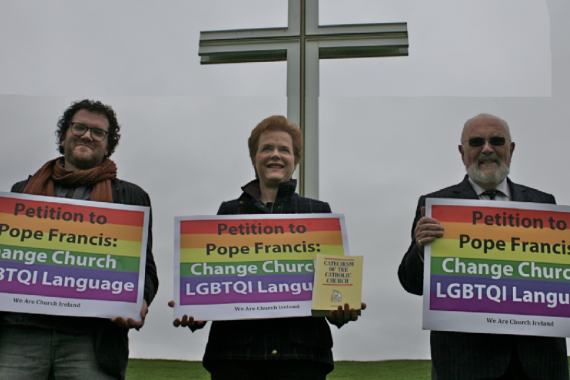31 May 2018
 We Are Church International (WAC-Int’l) strongly rejects Archbishop Luis Ladaria’s claim that the ban on ordaining women to the Catholic priesthood has “definitive character” and “is a truth belonging to the deposit of faith.” This teaching is outlined in Pope John Paul’s 1994 apostolic letter Ordinatio Sacerdotalis.
We Are Church International (WAC-Int’l) strongly rejects Archbishop Luis Ladaria’s claim that the ban on ordaining women to the Catholic priesthood has “definitive character” and “is a truth belonging to the deposit of faith.” This teaching is outlined in Pope John Paul’s 1994 apostolic letter Ordinatio Sacerdotalis.
Ladaria, who currently heads the Congregation for the Doctrine of the Faith, and who will be elevated to the order of Cardinals in June 2018, also said that Jesus’ intent is clear, as he bestowed the sacrament of ordination on “the twelve apostles, all men, who, in turn, communicated it to other men.” Of course, Jesus never ordained anyone. If being commissioned by Jesus to preach the Gospel is what is meant by ordination, wouldn’t Mary Magdalene, told by the risen Christ to proclaim the resurrection, be a priest?
Ladaria further said that challenging this teaching “… creates serious confusion among the faithful, not only about the Sacrament of Orders as part of the divine constitution of the Church, but also about the ability of the ordinary magisterium to teach Catholic doctrine in an infallible way."
Colm Holmes, Chair of WAC-Int’s, said, “Archbishop Ladaria’s attempt to invoke Jesus to justify the continued exclusion of women from church ministry and leadership is a distortion of our faith. The claim that patriarchal structures have divine origins and that women’s second-class status is sanctioned by God is a fallacy perpetuated by the celibate male clerical class. It undermines the church’s social justice work around the globe and puts the lives of women and children at risk.”
Holmes noted, “The ordination of women is supported by majorities of Catholics in many nations, including Argentina, Brazil, France, Italy, Spain, and the US.* Catholics understand that God’s call to service and leadership transcends gender, and know that women are entirely capable of ordained ministry.”
Holmes said, “The inequality of women in the Catholic church is a matter of intense global conversation at the moment,” noting former Irish President Mary McAleese’s well-regarded recent address at the Voices of Faith convening in Rome on International Women’s Day where she said: ‘the Catholic Church has long since been a primary global carrier of the virus of misogyny. It has never sought a cure though a cure is freely available. Its name is “equality”’.
“Catholic women and the men who support them are pushing back against policies and teachings that reinforce misogyny and discrimination. Archbishop Ladaria’s ill-advised comments are another example of the hierarchy’s desperate effort to maintain its status as an all-male power block. However, as we are seeing around the world, time is up for such exclusion and injustice.”
* Univision, 2014.
Contact: Marianne Duddy-Burke, This email address is being protected from spambots. You need JavaScript enabled to view it., +1 617-669-7810
#######
We Are Church International (WAC-I) founded in Rome in 1996, is a global coalition of national church reform groups. It is committed to the renewal of the Roman Catholic Church based on the Second Vatican Council (1962-1965) and the theological spirit developed from it.
 Recent statements by Pope Francis and top Vatican officials support the need to bring more lay women to top leadership positions at the Roman Curia. However, Voices of Faith is concerned about the apparent difficulties and lack of transparency in regard to how those women are chosen and the process undertaken to appoint them. In an extensively quoted interview with Reuters on June 17th 2018, Pope Francis is reported saying, “I don't have any problem naming a woman as the head of a dicastery." At the same time, he talks about difficulties in finding the right candidates and convincing curial officials to accept women for leadership positions. The Prefect of the Dicastery of Laity, Family and Life, Cardinal Kevin Farrell, stated that the Vatican is "overloaded with clerics" and that "administrative functions within the church can be done by anybody" including laity.
Recent statements by Pope Francis and top Vatican officials support the need to bring more lay women to top leadership positions at the Roman Curia. However, Voices of Faith is concerned about the apparent difficulties and lack of transparency in regard to how those women are chosen and the process undertaken to appoint them. In an extensively quoted interview with Reuters on June 17th 2018, Pope Francis is reported saying, “I don't have any problem naming a woman as the head of a dicastery." At the same time, he talks about difficulties in finding the right candidates and convincing curial officials to accept women for leadership positions. The Prefect of the Dicastery of Laity, Family and Life, Cardinal Kevin Farrell, stated that the Vatican is "overloaded with clerics" and that "administrative functions within the church can be done by anybody" including laity.
 Today, Thursday 7th June We Are Church Ireland is launching a petition calling on Pope Francis to change Vatican theological language that is gravely insulting to LGBTQI people.
Today, Thursday 7th June We Are Church Ireland is launching a petition calling on Pope Francis to change Vatican theological language that is gravely insulting to LGBTQI people. We Are Church International (WAC-Int’l) strongly rejects Archbishop Luis Ladaria’s claim that the ban on ordaining women to the Catholic priesthood has “definitive character” and “is a truth belonging to the deposit of faith.” This teaching is outlined in Pope John Paul’s 1994 apostolic letter Ordinatio Sacerdotalis.
We Are Church International (WAC-Int’l) strongly rejects Archbishop Luis Ladaria’s claim that the ban on ordaining women to the Catholic priesthood has “definitive character” and “is a truth belonging to the deposit of faith.” This teaching is outlined in Pope John Paul’s 1994 apostolic letter Ordinatio Sacerdotalis.